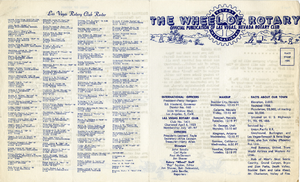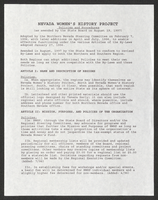Search the Special Collections and Archives Portal
Search Results
Gay history: Las Vegas, 2017
Level of Description
Archival Collection
Collection Name: Dennis McBride Collection on LGBTQ Las Vegas, Nevada
Box/Folder: Box 30
Archival Component
John Hardie Moss Jr. oral history interview
Identifier
Abstract
Oral history interview with John Hardie Moss Jr. conducted by Phyllis Sherwin on February 22, 1981 for the Ralph Roske Oral History Project on Early Las Vegas. In this interview, Moss discusses his career as a world-class poker player and professional gambler in Las Vegas, Nevada. Moss describes the intricacies of poker and gambling, gambling for high-stakes, and cheating in the gambling world.
Archival Collection
Claytee D. White oral history interview
Identifier
Abstract
Oral history interview with Claytee D. White conducted by Stefani Evans on November 2, 2023 for the African Americans in Las Vegas: a Collaborative Oral History Project. In this interview, Claytee D. White, founding directory of the Oral History Research Center at UNLV Libraries, celebrates the twentieth anniversary of the OHRC by contributing her oral history to the collection.
She begins by explaining how the system of sharecropping worked in her family near rural Ahoskie, North Carolina, and she talks about the field work involved in raising cotton, tobacco, corn, and peanuts. The fifth of eight children and the first daughter, she shares memories of going into town with her mother, of admiring her women teachers, and of attending North Carolina Central College (now University) for two years before moving to Washington, D.C., and working for the telephone company.
After recalling her two years in D.C. and 22 years in Los Angeles, California, she describes "running away" to Las Vegas, Nevada in the early 1990s. Here, at the History department at UNLV, she recalls learning to conduct oral histories. White shares memories of her first interviews with Hazel and Jimmy Gay and Lucille Bryant. She talks of matriculating to the College of William and Mary for her PhD and of returning to Bertie County to live with her mother and administer the office of The Shaw University Center for Alternative Programs in Education (CAPE). She describes how she was offered the position of OHRC founding director, why it matters that she was an "opportunity hire," and how it feels to be the only Black person in a room.
Archival Collection
Maxine and Jack Cason oral history interview
Identifier
Abstract
Oral history interview with Maxine and Jack Cason conducted by Claytee D. White and Stefani Evans on September 22, 1016 for the Building Las Vegas Oral History Project. In this interview, Jack discusses his early life in Oklahoma and arriving to Las Vegas, Nevada in 1950. He recalls the formation of Saveway Super Service, Philips 66 service stations, the competition in the fuel industry, and the opening of the first Rebel service station. Jack talks about fuel terminals, fuel bulk plants, and becoming one of the largest fuel providers in southern Nevada. Later, Maxine and Jack talk about supporting local sports organizations. Lastly, Jack discusses his involvement in the University of Nevada Las Vegas (UNLV) Athletics Department, and being inducted into the UNLV Sports Hall of Fame.
Archival Collection
Victoria and Brad Babich oral history interview
Identifier
Abstract
Oral history interview with Victoria and Brad Babich conducted by Claytee D. White on November 22, 2013 for the Boyer Early Las Vegas Oral History Project. In this interview, the Babich couple describe their family histories and life in Las Vegas, Nevada during the mid-twentieth century. Brad Babich discusses his father's work in the gaming industry of Las Vegas, the prevalence of organized crime in the city, the influence of Howard Hughes and the federal government, and other aspects of Las Vegas history. He also talks about nuclear weapons tests at the Nevada Test Site and the health problems some employees acquired there. The two talk about recreational activities of the time, as well as the entertainers that performed on the Las Vegas Strip. Other topics of discussion include race relations in Las Vegas, casino history, and changes that have occurred over the years in the city.
Archival Collection

The Wheel of Rotary Las Vegas Rotary Club newsletter, December 22, 1949
Date
Archival Collection
Description
Text

Nevada Women's History Project bylaws, policies, and procedures
Date
Archival Collection
Description
Folder from the Nevada Women's History Project Records (MS-00406).
Text
History of Las Vegas, Nevada, 1961
Level of Description
Archival Collection
Collection Name: Oran K. Gragson Papers
Box/Folder: Box 10
Archival Component
Manuscript on Las Vegas history, 1986
Level of Description
Archival Collection
Collection Name: Ralph Roske Papers
Box/Folder: Box 09 (Restrictions apply)
Archival Component
Carolyn Whaley oral history interview
Identifier
Abstract
Oral history interview with Carolyn Whaley conducted by Diana Rhodes on March 22, 2005 for the UNLV Women's Studies Veteran Oral History Project. Whaley discusses her early interest in music and her successful audition for the United States Air Force Women's Air Force (WAF) Band in 1959. She explains that the band was the only all-female band in the military between 1951 and 1961, and shared a number of stories about the function and activities of the band. Later, she discusses her civilian career as a music teacher in Barstow, California and decision to move to Las Vegas, Nevada after her retirement in 2000. She also remarks on the lack of interest that officials at Nellis Air Force Base in Las Vegas showed in veterans.
Archival Collection
